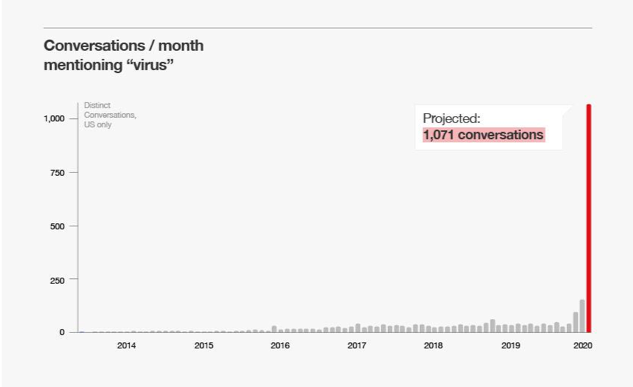Crisis Counseling During the Coronavirus Pandemic
Words by Kazi Maisha
Graphic by Aspasia Celia Tsampas
The coronavirus pandemic has inarguably overtaken any provocative Kardashian photo or the next celebrity’s pregnancy as the top headliner in media. With one Google search of the virus, 3,170,000,000 news articles are suggested as of March 20. Celebrity figures, such as Cardi B and Kehlani, have voiced their concerns over social media to reach others. Many of us have had to self-isolate due to the exponentially increasing number of cases in the United States. Schools have been closed. Jobs may have closed as well or shifted to an at-home task. The coronavirus has taken up so much of our lives, and it’s terrifying people


The coronavirus anxiety is explicitly seen at Crisis Textline, where I volunteer as a Crisis Counselor. The free, 24/7 text line serves as a platform where people can reach out to trained counselors whenever they are in any type of crisis. Being one of those trained Crisis Counselors, it is my responsibility to help people in hot moments steer towards a cooler calm and understand they are not alone.
According to Crisis Trends, a database that analyzes patterns among conversations in Crisis Text Line, from January 24 (11 days after the first reported death due to the virus) to February 28, the word “virus” was mentioned 229 times. Seventy-six of those cases explicitly mentioned the coronavirus. In those conversations, anxiety, a concern for what is coming, and powerlessness were prominent. Within the first two weeks of March, the number of conversations mentioning the word “virus” increased by a scale of 10. This increasing number correlates with the increasing number of cases in the world. The coronavirus anxiety is expected to grow steeper as the virus continues to spread.
Furthermore, by surveying 25 Crisis Counselors, I have noted that a major stimulus of coronavirus anxiety among texters consists of the bombardment of information regarding the virus by the media, as people have trouble deciphering the truth from misinformation before even more information about it is posted. Another prominent area of anxiety regards the texters’ concern for their own health or the health of people who are close to them. In addition to the anxiety, school closings, job closings, familial issues, and financial problems are all co-presenting issues, as the coronavirus is slowly starting to consume and alter our daily lives.

Coping techniques that have been noted to increase texter satisfaction include validating pain and brainstorming ways to get back the pieces of our daily lives that may have been limited due to the virus. Validating pain involves accepting everybody’s complaints as reasonable. Affirming that it’s okay to not be okay tends to help texters feel at ease. Brainstorming ways to get back pieces of our daily lives relates to the shift in our everyday activities that have occurred due to the virus. This includes, as mentioned before, school and job closings and greater susceptibility to health issues for the immunocompromised. In certain states, such as New York, many people can’t go to the gym for a relaxing exercise session, eat out with their friends, and watch a hilarious movie at the theater. As the virus continues to spread, it is expected that more facilities that have played crucial parts in our daily lives may not be as accessible anymore, as it is imperative that social distancing occurs to flatten the curve. This institutional inaccessibility is something that continually makes it harder for people to be content during the pandemic. Coping techniques that were brainstormed so that texters could regain that sense of familiarity with their lives include getting closer with family and friends and finding indoor substitutes for outside activities, such as exercising at home. Furthermore, many texters have opted to read coronavirus information solely from reliable sources, such as the CDC, so they are not overdriven by the great amount of information, fake and real, regarding the virus that is disseminated. These techniques have shown to greatly reduce coronavirus anxiety and may be utilized by you if you are feeling as stressed.
Overall, the coronavirus pandemic is nightmarish. As noted by Crisis Trends, popular words said by texters from states most affected by the coronavirus are “abandoned” and “sinking”. However, the top word is “courage”, with “family”, and quite specifically, “mom”, following in popularity. This implies that while in reality, things seem to be snowballing for society as a whole, most of us still have the courage to push through. And if it is difficult to feel courageous, many of us have family or a good support network that can help us feel alright. If you do ever feel alone, you can always text in. We’ll get through this together.





